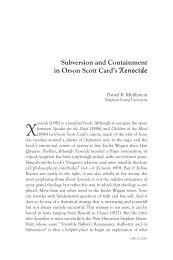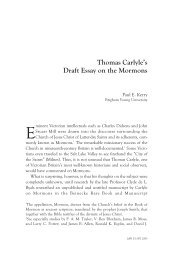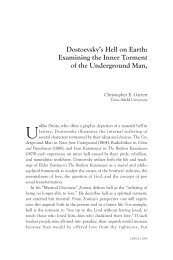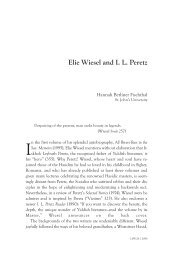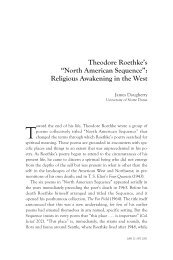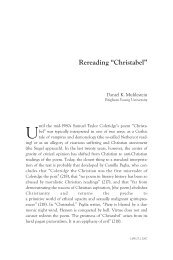Bret Harte, Unitarianism, and the Efficacy of Western Humor
Bret Harte, Unitarianism, and the Efficacy of Western Humor
Bret Harte, Unitarianism, and the Efficacy of Western Humor
You also want an ePaper? Increase the reach of your titles
YUMPU automatically turns print PDFs into web optimized ePapers that Google loves.
The plover from <strong>the</strong> marshes calling,<br />
And in yon western sky, about<br />
An hour ago, a star was falling.” 1<br />
“A star? There’s nothing strange in that.”<br />
“No, nothing; but, above <strong>the</strong> thicket,<br />
Somehow it seemed to me that God<br />
Somewhere had just relieved a picket.”<br />
(3, 4)<br />
Scharnhorst: <strong>Harte</strong> <strong>and</strong> <strong>Western</strong> <strong>Humor</strong> / 95<br />
<strong>Harte</strong> believed, too, that by raising money for <strong>the</strong> U. S. Sanitary Commission<br />
<strong>and</strong> battling Sou<strong>the</strong>rn sympathizers up <strong>and</strong> down <strong>the</strong> state King had<br />
almost single-h<strong>and</strong>edly saved California for <strong>the</strong> Union.<br />
<strong>Harte</strong>’s <strong>Unitarianism</strong> led him in turn to become <strong>the</strong> California correspondent<br />
<strong>of</strong> <strong>the</strong> Christian Register, <strong>the</strong> Boston Unitarian weekly. Between<br />
January 1866 <strong>and</strong> November 1867 he contributed nineteen<br />
essays to its pages in which he chronicled, as he put it, “<strong>the</strong> prosperity<br />
<strong>of</strong> Liberal Christianity” on <strong>the</strong> west coast (<strong>Bret</strong> <strong>Harte</strong>’s California 20).<br />
He repeatedly celebrated <strong>the</strong> growth <strong>of</strong> what he called <strong>the</strong> “Pacific<br />
branch <strong>of</strong> <strong>the</strong> Liberal Christian Church” or “<strong>the</strong> Liberal Society” in<br />
<strong>the</strong> West (61, 96). In March 1866, on <strong>the</strong> second anniversary <strong>of</strong> King’s<br />
death, for example, <strong>Harte</strong> reported that <strong>the</strong> First Unitarian Church <strong>of</strong><br />
San Francisco “was thronged with a multitude to whom King’s memory<br />
was precious” to hear “an eloquent discourse” by his successor<br />
“upon <strong>the</strong> ‘Divine Nature in Humanity’” delivered “from <strong>the</strong> pulpit<br />
his presence had consecrated” <strong>and</strong> including “a tender tribute to his<br />
memory” (23).<br />
Let me be as explicit as possible: <strong>Harte</strong>’s best <strong>and</strong> best-known stories,<br />
all <strong>of</strong> <strong>the</strong>m written for <strong>the</strong> Overl<strong>and</strong> Monthly between 1868 <strong>and</strong> 1870—<br />
“The Luck <strong>of</strong> Roaring Camp,” “Mr. Thompson’s Prodigal,” <strong>and</strong><br />
“Miggles” among <strong>the</strong>m—were written from a Unitarian or liberal Christian<br />
perspective. Each <strong>of</strong> <strong>the</strong>se three tales burlesques or o<strong>the</strong>rwise evokes<br />
biblical texts in order to challenge narrow or comfortable beliefs. That<br />
is, <strong>Harte</strong>’s most popular tales were <strong>of</strong>ten antiparables defying overtly di-<br />
1 <strong>Harte</strong>’s poem appeared a year before Whitman invoked a similar trope in<br />
“When Lilacs Last in <strong>the</strong> Dooryard Bloom’d.”



